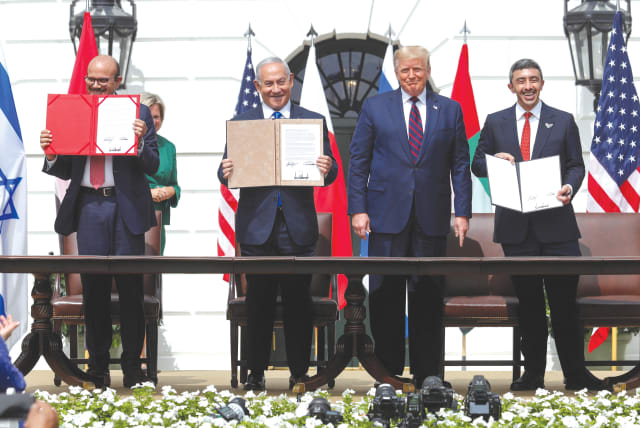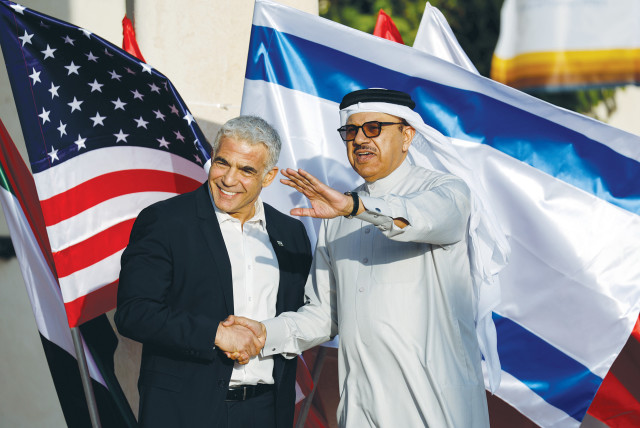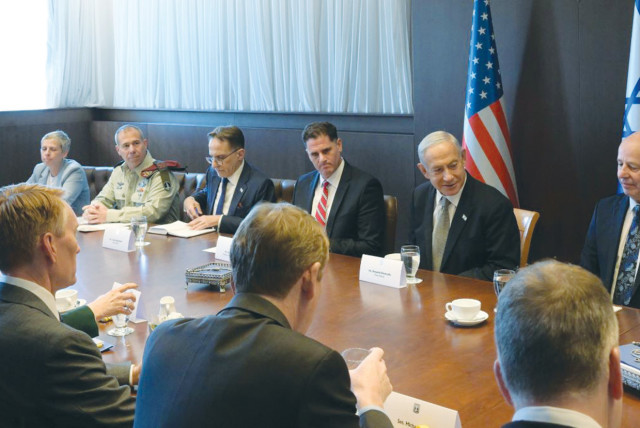Experts divided between optimists, pessimists on fate of Abraham Accords

The Abraham Accords signed between Bahrain, the Emirates, and Israel are going through a critical stage.
It is the first real test of the Abraham Accords signed on September 15, 2020, between Israel and two Gulf Arab states—the United Arab Emirates and Bahrain—nearly a month after the Hamas attack on Israeli territory on October 7, and the subsequent war in Gaza.
Bahrain announced through its parliament that the Bahraini ambassador to Tel Aviv was recalled to Manama, that the Israeli ambassador to Manama had left in protest, and that economic cooperation between the two countries had been halted due to the Israeli war against Hamas.
The Israeli Foreign Ministry responded in a statement that there was no official notification from the Bahraini government about the return of the two ambassadors and that relations with Bahrain were “stable,” noting that “the issuance of this statement through the parliament is an attempt to absorb popular anger.”
Bahrain later responded, through its official spokesman for the government, that “the Israeli ambassador left, and the Bahraini ambassador also returned, and there are no flights between the two countries.” However, the statement did not mention a Bahraini protest about the war.
The statement added, “The priority of efforts at this stage must be focused on protecting the lives of civilians in accordance with international humanitarian law and working to secure urgent humanitarian corridors to deliver relief and medical aid to the Gaza Strip in light of the difficult humanitarian conditions in the Strip, and the need to spare the region from the consequences of a new spiral of violence and work to creating a clear political horizon for a just, comprehensive and sustainable peace that guarantees stability and security for all.”
9 Arab countries issue 15-pt statement on end to escalation
As for the Emirates, relations with Israel are apparently stable, but no “announced” contacts or meeting have taken place between officials of the two countries.
Bahrain and the UAE, along with seven other countries—Qatar, Saudi Arabia, Kuwait, Oman, Morocco, Jordan, and Egypt—issued a 15-point statement that called for an end to the escalation currently taking place in Gaza and for a direct cessation of the ongoing war there and all military operations. This is in addition to their rejection of the “forced displacement” of Palestinians from Gaza, and their call for the speedy implementation of a two-state solution.
Manama and Abu Dhabi also launched campaigns to collect donations for Gaza, and UAE President Mohammed bin Zayed Al Nahyan announced that the state would sponsor the treatment of 1,000 Palestinian children and hosting of their families in UAE hospitals, plus their return after the end of treatment.
At the media level, the official and private newspaper and television channels of the two countries cover the current events in Gaza daily, focusing their coverage on civilian victims, especially Palestinians, and criticizing the Israeli military attacks on the Gaza Strip.
At the popular level, Bahrain allowed weekly demonstrations in solidarity with Gaza, while two of the demonstrations took place in front of the embassies of Israel and the United States; no demonstrations were covered in the United Arab Emirates, which usually does not allow any demonstrations of any kind, for any reason.
A semiofficial source confirmed to The Media Line, “There is no stopping the ongoing projects between Israel and the UAE, or even between Israel and Bahrain.”
The source, who preferred not to reveal their name, indicated, “Naturally, there will be a cessation of work due to the ongoing war between Israel and the Gaza Strip. Also, due to the war, airlines [flights] from the two Gulf states to Tel Aviv have stopped, which is normal.”
Israel-UAE coordination continues
In fact, while Tel-Aviv-Manama flights have stopped, flights between the UAE and Israel continue.
The source also confirmed “the continuation of military coordination between these countries, especially in light of talk about the expansion of the conflict, and the possible entry of other parties such as Iran, the Iranian-backed militias in Iraq and Syria, Hezbollah, and the Ansar Allah Al-Houthi movement in Yemen into the circle of conflict, which may directly affect the security of the Gulf.”
The source indicated that “all parties seek to prevent the conflict from expanding into a larger circle.”
Regarding the fate of the Abraham Accords, Amjad Taha, an expert in political and strategic affairs who resides in the Emirates, confirmed to The Media Line, “The Abraham Accords are continuing and stable.”
Taha added, “The Abraham Accords solve such a crisis. It’s a framework through which diplomatic and political solutions can be found to all these security and military crises in the region.”
“The best solution to what is happening in Gaza today,” Taha continued, “is to go to dialogue, a cease-fire, and find humanitarian solutions for the people of Gaza, which is among the principles of the Abraham Accords, which always seek the best for the region and its people.”
He said, “After this crisis ends, and the Palestinians get rid of Hamas and its crimes, and the decision becomes in the hands of the Palestinian National Authority and the people of Palestine, we will be closer to the two-state solution than before.”
Taha predicted, “As we get closer to approving the two-state solution, we will find more Arab countries that will join the Abraham Accords, normalize relations with Israel, and perhaps sign agreements with Tel Aviv similar to the Abraham Accords.”
He said, “If the region had previously expanded the Abraham Accords, we would not have witnessed such a crisis and events; or [we’d] even deal with it in a better and completely different way, and terrorist organizations such as Hamas, Hizbullah, and the Houthis would not have had any voice as is the case now.”
UAE scholar skeptical about Biden admin's commitment to Accords
Dr. Najat Al-Saeed, a political media scholar at the American University in the Emirates, expressed deep skepticism about the Biden Administration’s commitment to the Abraham Accords. Al-Saeed suggests the administration’s approach is characterized by a lack of vision and strength, particularly on complex issues like the accords.
She told The Media Line, “Since the Biden Administration won, my opinion has been very pessimistic about the fate of the Abraham Accords signed between Bahrain, the Emirates, and Israel, because this administration, in my view, is weak and floundering in every aspect; it has no vision, especially on a thorny and complex subject like the Abraham Accords.”
She criticized the administration for its stance on the accords, which she believes stems from a partisan rejection of Trump-era policies. Al-Saeed views this as indicative of a superficial outlook that could ultimately harm America’s standing and embolden its adversaries.
Discussing the Biden Administration’s foreign policy actions, Al-Saeed points to the removal of the Houthi militia from the terrorist list and efforts to reengage with Iran as signals of a retreat from assertive regional leadership. She perceives these actions, along with the chaotic withdrawal from Afghanistan, as concessions to extremists, undermining prospects for regional peace.
Al-Saeed questioned the feasibility of public peace talks between Saudi Arabia and Israel under an administration she views as “floundering,” suggesting that the increase in regional terrorism could undermine the accords.
“How can public peace talks be held between the largest Arab country and Israel in light of the spread of security chaos and the [non-] release of terrorists in various places?” she asked.
“The louder the voice of terrorist organizations in the region, the weaker the fate of the Abraham Accords will be, especially with regard to warm peace between peoples, as the moderate voice will weaken in the face of violence,” she said.
In Al-Saeed’s view, “the only hope for the Abraham Accords is to elect a president from the Republican Party who prioritizes the peace process as a strategic solution to extremism and the Palestinian issue.” Conversely, she fears that a reelection of the Biden Administration could mean continued chaos and violence in the region, potentially reducing the Abraham Accords to a nominal agreement with limited government-level engagement.
US-based analyst sees bleak outlook for Accords
Dr. Mac Sharqawi, a US-based political analyst, conveyed a bleak outlook on the future of the Abraham Accords, suggesting a halt in progress. Sharqawi told The Media Line that Bahrain had informally ceased initiatives with Israel, and that similar moves may arise from the UAE. He remarked on Jordan’s decision to pull its ambassador from Tel Aviv and mentioned that various Latin American countries, including Bolivia, Chile, and Colombia, have cut ties with Israel.
Sharqawi said 121 countries had taken a stance against Israel’s military actions in Gaza, a move he sees as a “political siege” that could resonate with the Arab public. He doubted any further expansion or negotiations under the Abraham Accords without a two-state resolution for Israel and Palestine. Sharqawi pointed out that during talks on normalizing relations with Israel, Saudi Arabia’s Crown Prince Mohammed bin Salman stressed the need to address the Palestinian issue, which remains crucial to the Arab world.
The analyst also mentioned suspicions of “‘ancient and modern’ Israeli intentions to empty Palestine of Palestinians” and impose its own solution, which could lead to a suspension of the Abraham Accords. He pondered the accords’ ultimate destiny, which hinges on Israel’s next actions. Sharqawi concluded that the accords might regain momentum if Israel is persuaded to join more countries by advancing the two-state solution, in line with the Arab Peace Initiative launched by the late Saudi King Abdullah at the 2002 Beirut Summit.
Sufyan Al-Samarrai, editor-in-chief of the Baghdad Post, and a political analyst, was very optimistic and told The Media Line, “The Abrahamic agreement still exists and the two-state solution is inevitably coming.”
Al-Samarrai points to the ongoing struggle between nations seeking stability and terrorist groups using religion as a guise to impede the creation of a new Middle East. He observes a consensus among allies that “Iranian-funded gangs” are the main obstacle to achieving a comprehensive peace in the region.
Al-Samarrai sees recent attacks as a deliberate attempt by these groups to derail the potential Israel-Palestine two-state solution, which was nearing realization through talks with Saudi Arabia. He believes statements from Hamas leaders in Qatar confirm their opposition to normalization with Israel and peace agreements. Al-Samarrai interprets the change in rhetoric from Hamas leader Ismail Haniyeh during his travels from Doha to Tehran as an adherence to Iranian directives rather than independent decision-making.
“There is a difference in the speech of Ismail Haniyeh, the head of the Hamas militia. When he was in Doha and before his travel to Iran, he said that the two-state solution must be approved, and later when he arrived in Tehran, he said there is [none] and we do not want a two-state solution. It is not his decision, but rather what Iranian orders dictate to him and to others,” Al-Samarrai said.
In his view, the expansion of the Abraham Accords is anticipated once terrorist militias are subdued, hinting at future operations aimed at stabilizing the region and paving the way for more countries to join the peace initiative.
Mohammad Al-Subaie, a political affairs researcher, shared his perspective with The Media Line on the intent and current status of the Abraham Accords. He explained that the accords were established with the goal of fostering peace in the Middle East and facilitating a two-state solution.
Al-Subaie believes that while the future of these agreements is uncertain, signatory countries are united in their rejection of civilian targeting by any group and will not condone violence.
Despite the challenges presented by the war and regional turmoil, Al-Subaie said, “My personal expectation is that these agreements will continue, but now they are certainly frozen due to the war and the current conditions in the region.”
Jerusalem Post Store
`; document.getElementById("linkPremium").innerHTML = cont; var divWithLink = document.getElementById("premium-link"); if (divWithLink !== null && divWithLink !== 'undefined') { divWithLink.style.border = "solid 1px #cb0f3e"; divWithLink.style.textAlign = "center"; divWithLink.style.marginBottom = "15px"; divWithLink.style.marginTop = "15px"; divWithLink.style.width = "100%"; divWithLink.style.backgroundColor = "#122952"; divWithLink.style.color = "#ffffff"; divWithLink.style.lineHeight = "1.5"; } } (function (v, i) { });


